Arab nations had an opportunity to prove that the shifting of alliances transcends the hush-hush, off-the-record meetings between heads of state or the mere observations of political analysts.
Leaders from throughout the Arab world came to hear and show support for an ambitious plan that would allow Palestinians to prosper and Israelis to have peace, but more importantly would isolate Iran's regime.
In an exclusive interview with me, White House adviser Jared Kushner – the president’s son-in-law and architect of the Middle East economic and peace plans – called the workshop in Bahrain “tremendously successful.” He said it “also started a new conversation in the Arab world about a future for the Israeli and Palestinian people.”
While peace between the Israelis and Palestinians would translate into more security for people on both sides, it would also diminish Tehran’s footprint in the Arab world.
“Nothing is a bigger threat to regional security than Iran,” Kushner said, noting that while the economic plan outlined “exciting opportunities for prosperity and security,” there’s a more complex regional consequence for the Arab states supporting this initiative.
While peace between the Israelis and Palestinians would translate into more security for people on both sides, it would also diminish Tehran’s footprint in the Arab world.
Some reports indicate that in recent years, Iran has given up to $1 billion annually to allied regional terrorist groups including Hezbollah, Hamas and others.
Late last year, U.S. Ambassador Nathan Sales, a counterterrorism adviser at the State Department, said that Iran’s support for Hezbollah alone is $700 million a year. Hezbollah – Iran’s four-decade proxy in the region and based in Lebanon – has fought multiple wars with Israel and has done much of dictator Bashar Assad’s dirty work in Syria.
More conservative estimates say Iran contributes about $100 million directly to Palestinian terrorist groups including Hamas, Palestine Islamic Jihad, and the Popular Front for the Liberation of Palestine-General Command.
Hundreds of Palestinians in the Gaza Strip protested the June 25-26 Manama conference. But the gathering nonetheless succeeded in attracting leaders and entrepreneurs from Arab nations – including Egypt, Qatar, Jordan, Saudi Arabia, Bahrain, the United Arab Emirates and Oman – in addition to Israeli and Palestinian business owners.
Kushner unveiled his economic prosperity plan during the conference. It would be contingent upon both the Palestinians and Israelis agreeing to the yet-to-be-seen political portion of the plan aimed at bringing peace between the two sides after decades of unrest.
The White House has not announced when the peace plan will be revealed, though an official said Sunday that a U.S. delegation will travel to the Middle East in coming weeks to finalize details.
Kushner – along with Middle East envoy Jason Greenblatt, State Department official Brian Hook and aide Avi Berkowitz – is scheduled to travel to the region at the end of this month through early August. The group plans to make stops in Israel, Jordan, Egypt, Saudi Arabia, the United Arab Emirates and Qatar.
The cornerstone of the economic plan is investing more than $50 billion in the Palestinian economy over 10 years. This would double the Palestinian gross domestic product, create over 1 million jobs and lower the Palestinian unemployment rate to single digits. It would also cut the Palestinian poverty rate by 50 percent, grow transportation and infrastructure, and invest heavily in significant sectors like tourism, agriculture, production and housing.
The goal is to also increase trade among Palestinians and countries in the region, consequently affecting the economies of Egypt, Israel, Jordan, and Lebanon, according to the White House.
In recent years, the White House has not concerned itself with the Arab world’s relationship with Israel or with curbing the actions of specific Arab nations regarding topics such as human rights or the funding of terror. But Washington has certainly factored in the collective contempt and desire among Sunni nations to reign in Iran’s mullahs and has used this to its advantage.
“Iran is an existential issue for the Arab states; the Palestinians are not,” said Eugene Kontorovich, professor at George Mason University Antonin Scalia Law School and director of its Center for International Law in the Middle East.
“Sunni Arab states need all the allies they can get against Iran, and Israel is one of them,” Kontorovich said. “Thus, they are no longer interested in a diplomatic solution that might endanger Israel's security.”
“The Trump administration has won vast amounts of goodwill in the (Persian) Gulf by canceling the JCPOA (Iran nuclear deal,) and this is one auxiliary consequence,” Kontorovich said.
It appears Sunni states have two major goals for their own interests: to keep terrorism out of their borders, thus ensuring the survival of the current leadership; and to curb the growing influence of Iran’s Shiite hegemonic agenda.
Peace between the Israelis and Palestinians – leading to a more cohesive, secure and thriving region – would help promote the Sunni states’ goals while cutting off a crucial nucleus of business for Iran’s regime.
For its part, it appears the White House is not looking to create new allies in the region but has strategized a sound Middle East policy grounded on aligned interests and political consequence.
"The Iranian regime’s regional aggression has brought the Arab nations and Israel closer together," Kushner said. "I think we’ll see that this cooperation can ultimately help advance diplomatic progress in other areas, including peace efforts."










